“What I learned from my military experience is that…there’s no way this is sustainable and there’s gonna be one day when we go back and die for this stuff.”
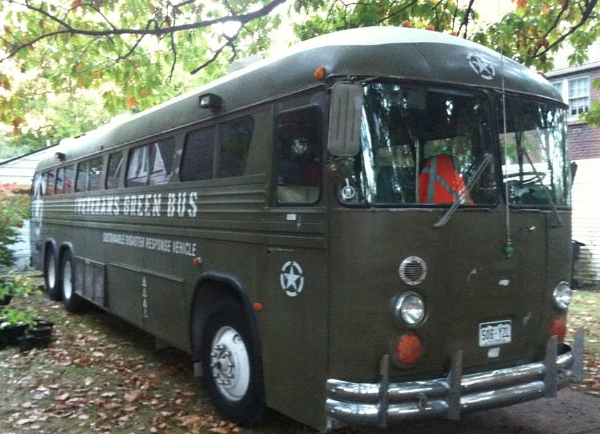
I meet a lot of really terrific people in my travels but Gordon Soderberg is one of he most selfless, compassionate men I’ve met in a very long time. He has devoted his entire life to serving others; first through his military service and then, since then, in working in disaster response and in recruiting and training veterans in this field.
From working with Cindy Sheehan’s anti-war protest to being on the front lines after hurricanes like Katrina and Sandy hit, the common element for Soderberg was a large, retro-fitted bus, painted Army green. When the hurricanes hit, Soderberg was there in the green bus, now called The Veterans Green Bus, coordinating first responders and helping those in need before longer-term help arrived.
To get a sense for the type of thing that Soderberg has done, take a couple of minutes to watch this video from a relief effort fundraiser in the aftermath of Hurricane Sandy. It’s remarkable:
Gordon Soderberg and the Veterans Green Bus are now stationed in Detroit. Soderberg’s goal is to further retrofit the bus — which runs on both biodiesel and cooking oil/grease — and to set up a permanent operation. With a fixed location, Soderberg and his team will be able to bring veterans in for training on sustainable energy implementation of all kinds from retrofitting vehicles to run on alternative fuels and making biodiesel fuel to rebuilding homes sustainably and how to coordinate a disaster response. In the process, they’ll be helping local vets learn new skills and find jobs while helping Detroit get back on its feet. Soderberg describes it as a “veterans green incubator”.
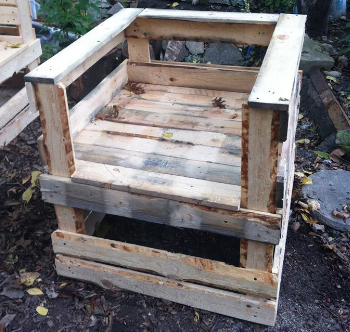 This Saturday from 10 a.m. until 5 p.m., Soderberg will be holding a fundraiser in the form of a Pallet Project Fundraiser. For $75, participants will receive training on building furniture like tables and chairs from pallets.
This Saturday from 10 a.m. until 5 p.m., Soderberg will be holding a fundraiser in the form of a Pallet Project Fundraiser. For $75, participants will receive training on building furniture like tables and chairs from pallets.
Participants will make one thing to take home, help build a group project, learn to make many useful things out of pallets, where to find them, where to buy them, how to deconstruct them. Fresh local lunch provided. Receive a 10% discount on the purchase of any finished projects.
You can sign up for the event HERE. The Facebook event page is HERE, where you can see pictures and RSVP.
I recently spoke to Gordon Soderberg about The Veterans Green Bus, its history, and why people in Michigan and, especially, in Detroit should be supporting their efforts.
Our interview is below. Enjoy.
So, Gordon, give me a bit of background on the Veterans Green Bus, what you’re doing with it, and how you ended up in Detroit.
We started after Katrina, we were down in New Orleans doing disaster response with a bunch of veterans and activists who were actually the instigators of Camp Casey in Crawford, Texas with Cindy Sheehan’s group, CODEPINK and their anti-war protest. We were members of Veterans for Peace, originally, and we had our Impeachment Tour bus in Dallas. We spent 26 days in the ditch in front of Bush’s ranch.

Gordon Soderberg at Camp Casey in Crawford, Texas
We had satellite internet on the bus. Katrina was rolling up into the Gulf and we saw where it was going and a lot of folks that were from New Orleans were booking flights into New Orleans from our bus using our internet and asking us what we were going to do with the bus. Originally we were planning to continue taking Cindy to DC to continue her anti-war protest. But I was a corpsman in the Navy and there were a lot of other medics that were there and so we decided to head over to Katrina instead. That’s what started my push for veterans to get into disaster response, that initial event.
Once we got there, we were using our internet to get out what we were finding in terms of the disaster response effort. That built to $500,000 worth of donations on our Paypal account. We started funding different groups that were doing different types of disaster response. We set up camps. We went to campgrounds. We put money into Common Ground, another disaster relief group across the river from New Orleans. We started a medical clinic. We told anyone that found us on the internet that, if you can get to us, that we’d pay for their fuel and their food so that they could get their supplies out.
Then, three weeks later, Hurricane Rita hit and caused another whole level of destruction so we had to start all over again in a bunch of different places, working with different communities that were hit with that. That snowballed into a long-term relief effort that Veterans for Peace didn’t want to get involved with. They thought it was a good action to do when there was an immediate and an obvious statement to make. But they weren’t really in the relief business.
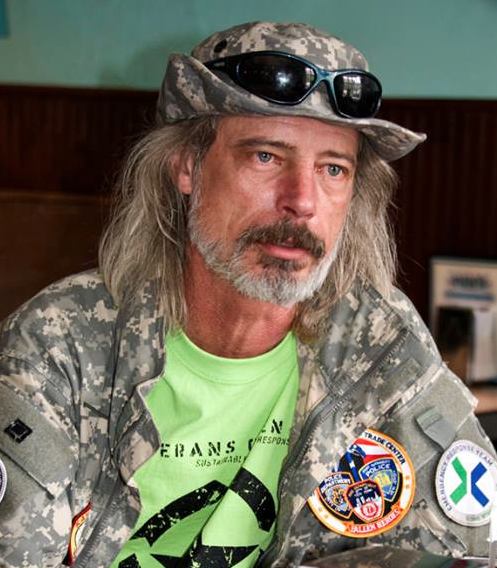 So, I set up United Peace Relief, a formal non-profit to do long-term relief. I stayed in New Orleans for essentially four and half, five years running different volunteer camps, helping various organizations use the internet and satellite. We moved satellite systems all over the place, using solar power and sustainable, green technologies. We built a biodiesel plant in our camp in Bayou Liberty and started making our own fuel.
So, I set up United Peace Relief, a formal non-profit to do long-term relief. I stayed in New Orleans for essentially four and half, five years running different volunteer camps, helping various organizations use the internet and satellite. We moved satellite systems all over the place, using solar power and sustainable, green technologies. We built a biodiesel plant in our camp in Bayou Liberty and started making our own fuel.
After five years there, who were you helping at that point?
The last two years that I was there, I was making biodiesel from oil that we were collecting out of the lower 9th ward in New Orleans and I was teaching vets how to make that fuel. And then we were running a tractor into the lower 9th ward to keep the lots cleared for folks that wanted to return but still had a one-way ticket out of town and no way back. We took care of about 150 lots in the lower 9th ward, keeping them cleared so that the city couldn’t seize them. And we did things like bring in musical instruments for schools that weren’t getting help and helping other organizations to dry wall and rebuild homes, things like that.
After that, Brad Pitt and the Make it Right foundation moved in and started building green homes on those lots. We got a few vets doing geothermal sinks for those homes.
Then we got hit by Gustav and Ike, two more hurricanes two weeks apart from one another. Our biodiesel plant was flooded in two feet of water and we were looking at an eco-disaster that we didn’t want to cause plus we were running short on money. So, at that point I started looking around for other veterans-based, green energy organizations. I sent a proposal into the Veterans Green Jobs Alliance, letting them know what I was doing and they, initially said, “we’re just a website, we don’t really do anything”. But they asked me if they could use my resumé to make a pitch for grant money to get some things going.
They wrote a proposal, gave it to Walmart, and Walmart funded them for $750,000 and we started Veterans Green Jobs. We moved the biodiesel plant to Louisiana Tech, put a local vet in charge of training at-risk kids on how to make biodiesel, and the organized through a local, grassroots organization to keep that running and I moved up to Colorado to help start programs for vets there, getting them involved in making homes more energy efficient.
Right about that time, Obama came into office and he immediately started putting a lot of money into this sort of thing so we ramped up pretty quick. We ended up with a contract with a grant from the governor’s office and we ended up going from working on 200 homes a year to 1,200 homes a year.
I had hoped to expand the program to get vets trained on making their own fuel. However, Congress had another idea. In 2010, we got 77% of our funding cut with 30 days notice. At that point we had to cut 77% of our staff. I realized at that point that the we needed something more sustainable that wasn’t subject to the whims of Congress. So I bought the bus back from Veterans Green Jobs, folded it back under United Peace Relief which we had kept going and started over.
We moved it to Detroit which is very similar to New Orleans in that they’re both massive disasters, just Detroit didn’t get wet! But it faces the same issues. It’s a good place to start up a non-profit and do R&D work. So we moved the bus here. We moved it here in October of last year, 2012. We were here maybe a week until Team Rubicon, another veterans disaster relief group, called us to help them respond to Hurricane Sandy. I had been encouraging them since they started and responded to the earthquake in Haiti. When I moved to Detroit I signed up to be part of their group, Region 5 out of Chicago, and then three days later I got called to help them in New York. They asked if I would take the bus and drive to Chicago to load up with supplies from Home Depot and volunteers and drive to New York.
So I did that and we set up a full base in Rockaway, New York with Team Rubicon and did disaster response there. We deployed some new technologies using military grade software that they were redeploying for disaster response. That went on for awhile and got a lot of attention. We got a visit from President Clinton and Chelsea.
![]()
President Bill Clinton visits with Team Rubicon after Hurricane Sandy
A few thousand other veterans came in and spearheaded a pretty good response there. Almost the exact opposite from what I would have expected after Katrina. With FEMA, it was a totally different animal. The disaster response was completely different. The interaction between the government and local, grassroots groups was pretty phenomenal. It was night and day compared with Katrina. With Katrina they were rarely around and, if they were, they were up in Baton Rouge, not in “the shit” as they say in the military. After Sandy, it was completely different. And the way they responded to the local start-up, grassroots groups that were self-initiating, it was night and day. Between Katrina and Sandy, I think FEMA has done an incredible about face. They really changed for the better.
So, you were in Detroit and then basically immediately got called away right?
Right. When we got here, I was going to organize a park clean-up project for Veterans Day. We were just going to get our feet wet here and start figuring out how we could organize another biodiesel plant in Detroit to fuel our gardening projects and work with other grassroots groups here. We have a board member who’s been a permaculturist in Detroit for thirty years or so and she was one of the first responders who came down to help us with Katrina.
So, we landed in her back yard, as it were, with the bus a year ago in October. She has a permaculture house that’s part of her program that she uses to run training programs, classes and things. She doesn’t live in it so she donated it to our project. We’re trying to bring it back to life, put heat in it, and stuff. It’s a pretty typical Detroit house but it’s owned outright so we’ve got real low overhead to develop our program with.
When we got called to New York, we spent about three months there. After that we did a bunch of different events for veterans groups and whatnot. During that time our bus caught fire. This was about the time we were debating using more sustainable energy. We brought in solar panels to power our communications equipment. Goal Zero, a company that makes solar camping systems and emergency solar systems had donated about $650,000 worth of solar powered equipment for Rockaways and used our base to disperse that donation. They ended up giving us a solar-powered system for the bus to power our refrigeration, etc. Also, Team Rubicon was really impressed with the help I had given them, this was their biggest project up to that point. So, they wanted to thank me for doing that. They knew we wanted to convert the bus to run on grease as well as biodiesel so they told me that, if I could find a company that would help me build it, they would pay for it.
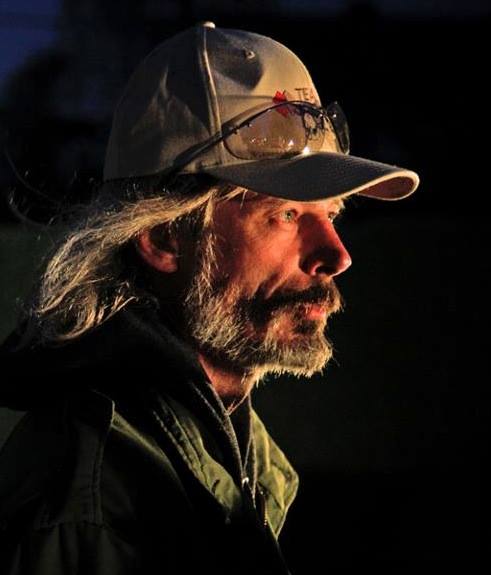 So, after Sandy we spent some time on a bit of a tour to prove that we could do disaster response on a bus that runs on biodiesel and grease. Because the largest cost for any nonprofit doing this sort of work is the fuel. Everybody has to pay for their fuel. Except us. At $4 a gallon to move a busload of people when you’re getting 10 miles to the gallon, you’re not going to be able to go very far on a short budget. But, if you’ve converted your bus to run on grease and every weekend you have a cooking event at a church or a social and you deep fry whatever, you save that grease and, over the course of a few events, you can aggregate enough fuel to get anywhere in the country.
So, after Sandy we spent some time on a bit of a tour to prove that we could do disaster response on a bus that runs on biodiesel and grease. Because the largest cost for any nonprofit doing this sort of work is the fuel. Everybody has to pay for their fuel. Except us. At $4 a gallon to move a busload of people when you’re getting 10 miles to the gallon, you’re not going to be able to go very far on a short budget. But, if you’ve converted your bus to run on grease and every weekend you have a cooking event at a church or a social and you deep fry whatever, you save that grease and, over the course of a few events, you can aggregate enough fuel to get anywhere in the country.
We converted the bus to hold four tanks that can hold about 400 gallons of fuel so we can get our bus from Detroit to any point in the continental United States with the fuel on board. And once we get there, we don’t have to pay to fuel up. We can just go to a restaurant and get a donation of used cooking oil. We’re capable of processing that grease, dewatering it, filtering it, demucking it, all that capability is on board.
You’re back in Detroit now. When did you get back?
It was about a month ago. We did the tour, caught fire, rebuilt the bus motor in Roanoke. We had just started running on grease and hadn’t really tested the bus and ourselves on being able to run with it. We needed to go through the bus and really get it mechanically dialed in, especially after having an engine fire. You end up having a lot of electrical problems. We fixed it up in Roanoke then I red-eyed it out to Seattle, Washington to really get it dialed in and have some work done on it out there. It only took one fill-up in Roanoke and that was all it took. We drove for four days and never had to get fuel. Then we did a tour down the west coast doing events with different veterans organizations; farming projects, housing projects, that sort of thing and demonstrating the bus’s capabilities to other veteran’s organizations, trying to recruit for disaster response and to show them, look, here’s a sustainability idea you can apply right here in your day to day lives.
We got back in Detroit about a month ago. We’ve essentially been on the road for more than a year.
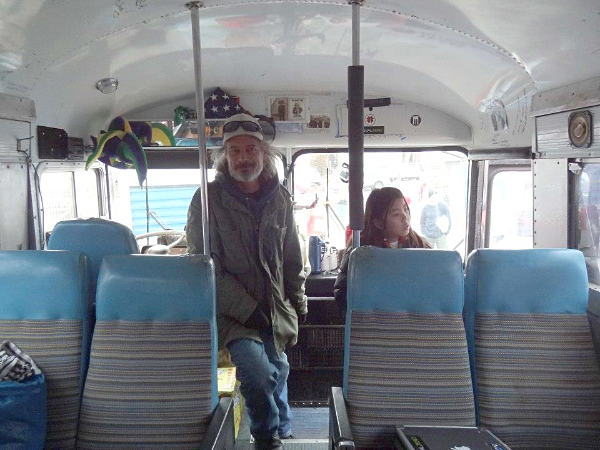
Gordon Soderberg inside the Veterans Green Bus
So, tell me about your event this weekend. What’s that about?
Well, we got done running the bus all around the country and we’ve got some more work to do on it still. So we’re trying to raise money for the bus project and to rebuild this veteran’s house we’ve had donated here. But, ultimately, we’re going to try to raise enough money to get a firehouse for the bus so we can do actual training, make our biodiesel, and operate a training program for vets.
A firehouse?!
Yeah, that’s why I came to Detroit originally. I’d heard that these city firehouses were starting to close down. A year ago I was driving around looking at these firehouses and seeing them being shuttered and thinking, “this would be a perfect place to drop the Veterans Green Bus”. It’s big enough of a building where we could drive the bus in. It’s designed for disaster response. Although we’re not firemen, we’re certified responders for FEMA. All our vets go through the certification process to be members of Team Rubicon; they don’t call you unless you’re certified. We also want to do green, sustainable rebuilding whether it’s a disaster or not. So, we figured a firehouse is a perfect place to drop our program.
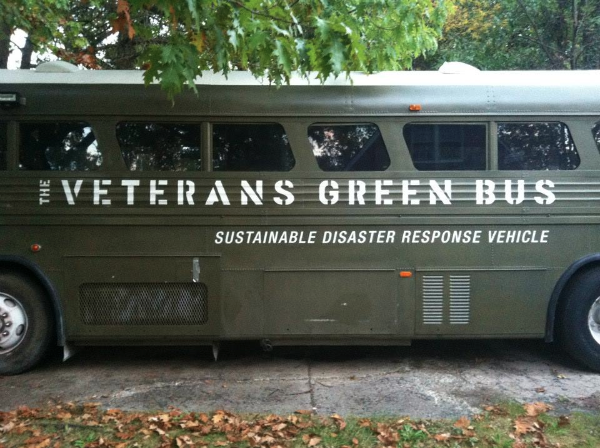
The Veterans Green Bus
And, you could duplicate it. I’ve been looking all around the country for firehouses and it seems as if this is a reoccurring nightmare for large urban areas. The city just can’t afford this infrastructure any longer or they’ve been replaced with new infrastructure. But, there’s these firehouses everywhere!
The economics being what they are in Detroit and the city in its current financial situation, it’s an affordable R&D project. You can buy one of these…I think the most expensive firehouse that the city’s auctioning right now is $150,000. Technically, I could buy it with my VA loan!
So, the idea is to, ultimately, put the bus in a firehouse. We could train vets how to make the fuel and how to convert vehicles to run on alternative fuels and run an actual business, whether that’s weatherization or pallet architecture [laughs] or rebuilding homes. You know, we really don’t care. I’ve been training vets…well, I’ve been doing disaster response for thirty years and I’ve been building homes and learning how to do sustainable things since I got out of the military thirty years ago. I’ve learned how to do a lot of different stuff and I’d kind of like to turn that onto other vets so they can do whatever they want. I’ve got a body of knowledge to share and it’s worked for a lot of vets. Wherever I’ve gone, I’ve passed it on and they’ve taken it further and further. We’re doing that here in Detroit now.
From the firehouse, we could respond to disasters nearly anywhere. And Detroit, being in the position that it’s in, it’s a place to bring vets TO to train them on disaster response. There’s a lot of buildings that need to be taken down here. It’ll take it a while for all of that to get cleaned up. That’s a lot of contract work the city could be hiring veterans to do.
So what you’re trying to do is set up something that’s permanent and sustainable over a long period of time.
Right. I learned a lot from doing government grants and government contracts and how that’s not sustainable, either! So, what I’m trying to apply is the good of all these things. You take sustainable living solutions, whether that’s solar or geothermal or whatever, and you try to reduce your energy impact and cost on both ends. You need to build sustainably — or REbuild sustainably — and the business model has to be adaptive. Like, with our military experience, you have to adapt. So, teaching these vets how to build a business sustainably that supports their economy doesn’t really require a business plan so much as an adaptive plan.
So, we teach them a bunch of business skills. One is “here’s how you make biodiesel”. “Here’s how you convert a vehicle to run on grease”. “Here’s how you tear down a house”. “Here’s how you rebuild one”. Where they take it and their career direction, that’s going to be up to them, anyway. I’m not trying to say, “this is the path to take”. I’m saying, “this is the direction you’re going to have to go to have a path to take!” I think the way government grants and contracts go, they’re fine, but you’ve got to know what you’re getting into.
When we started Veterans Green Jobs, we started with a plan to do finite things. We knew how long we had to do it and then that money would run out. When you get a government contract, it’s kind of vague. You start building up infrastructure to support that government contract and it becomes untenable if that government contract goes away. So, I think taking what I’ve learned from that and applying it to Detroit, I can see that if we can get grants so that we own the firehouse outright, then we can sustain ourselves doing different things whether it’s government contracts or grants or just work for hire. So, it’s a hybrid of nonprofit infrastructure that supports a small business. It’s kind of like a “veterans green incubator” if you can think of it that way.
So, a fundraiser this weekend. Where’s that taking place?
It’s at our Hereford house where we’re parked. We’re doing pallet garden construction. You can make a table, a bench, a chair, a barbecue stand, whatever you can think of. We’ve got several models already made that you can pick from.
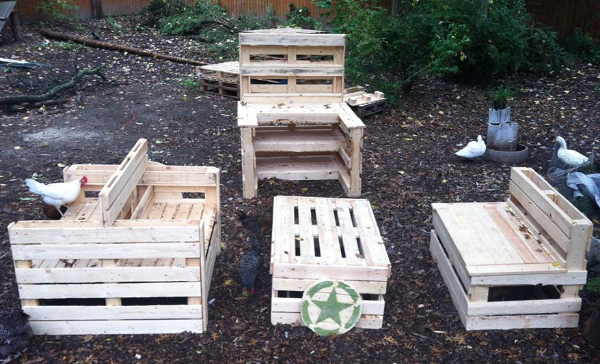
Would people need to bring their own pallets or will those already be there?
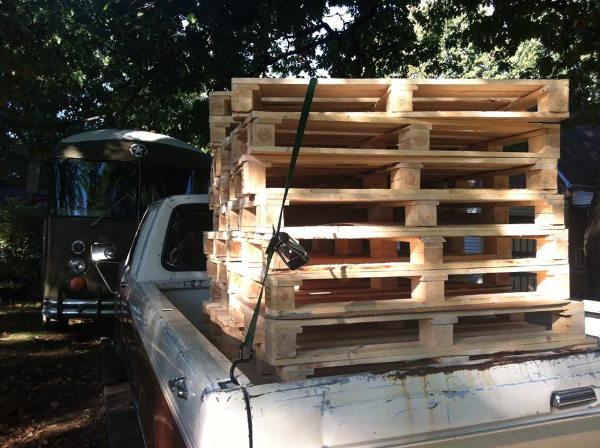 No, we have all the pallets. All the wood’s here, all the tools are here. All you gotta bring is your $75. We’re going to have a nice lunch and people are going to be able to build something, any one of these items, we’ll show ‘em how to build it and then they can take it home with them. All for 75 bucks.
No, we have all the pallets. All the wood’s here, all the tools are here. All you gotta bring is your $75. We’re going to have a nice lunch and people are going to be able to build something, any one of these items, we’ll show ‘em how to build it and then they can take it home with them. All for 75 bucks.
Then the week after that you’re off to Washington, D.C. to receive an award?
I don’t know if I’ll be receiving an award. I received an invitation to participate a “Champions of Change” event at the White House that is recognizing veterans that have used sustainable energy and their on the forefront of climate change and those impacts. Essentially everything from Operation Free, a Democratic veterans group that runs around the country talking about sustainable energy and investing in solar to guys like me that do disaster response and do work with other veterans. I don’t know if I’m just there to fill a room or if they’re going to be recognizing me, specifically, for what I’ve done. I just think it’s an honor to be invited to the White House and I can’t turn that down! Whatever comes of it, great. It’s all great.
I think it’s interesting that there are so many veterans groups doing sustainable energy stuff. I think that’s news, right there, that people don’t know about; that there are so many veterans groups that are actually out doing this kind of stuff, all related to sustainable energy and things like that.
Well, the military has been on the forefront, using solar for operating bases in Afghanistan. I mean, it’s a lot easier to bring nuclear power in from the sun than it is to truck it across Kandahar!
I don’t think most people know that. I think that’s very interesting. You guys are actually doing this stuff. You learned it in the military and now you’re bringing that expertise back to help your community.
I haven’t been in the military for awhile. It’s been 25-30 years since I was in. My job in the military was babysitting the oil dumping out of the Straits of Hormuz in the war between Iraq and Iran. So, what I learned from my military experience is that we need to learn how to do something different. There’s no way that this is sustainable and there’s gonna be one day when we go back and, eventually, die for this stuff. And, thirty years ago, I was right.
If you’re interested in participating in the Pallet Project Workshop this Saturday, you can sign up for the event HERE. Learn more about the project and RSVP at the Facebook event page HERE.
Follow The Veterans Green Bus on twitter at @TheGreenVeteran and learn more about them at their website HERE and their Facebook page HERE.
All photos courtesy of Gordon Soderberg and The Veterans Green Bus



